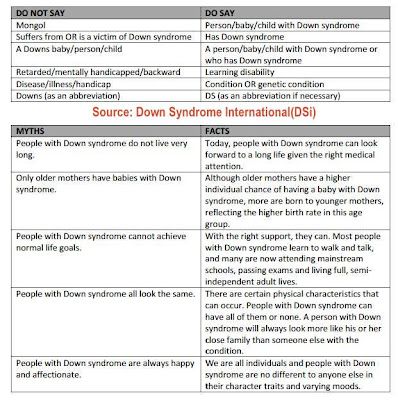On Friday 15 March 2013, ahead of World Down Syndrome Day on Thursday 21 March, Down Syndrome International (DSi) announced the recipients of the 2013 World Down Syndrome Day Awards.
2013 is the fourth year of the World Down Syndrome Day Awards, presented to individuals or organisations whose voluntary, professional or scientific activities have strengthened and enriched the lives of people with Down syndrome, or contributed to scientific advancement related to Down syndrome.
This year’s recipients are as follows:
Voluntary and Professional Awards
1 individual with Down syndrome receives an award for outstanding self-advocacy:
Karen Gaffney (USA) – Long distance swimmer, motivational speaker and President of the Karen Gaffney Foundation. Karen advocates for the inclusion of people with disabilities in all walks of life, offering motivational workshops and inclusive programmes.
1 individual receives an award for outstanding voluntary activities:
Mr Ratnasabapathy Sivanandam (Singapore) – Co-Founder of Down Syndrome Association (Singapore), who has led the organisation of many important initiatives and events in Singapore and Asia including Asia Pacific Down Syndrome Conference, World Down Syndrome Congress and World Down Syndrome Day.
Scientific Awards
3 individuals receive awards for outstanding contribution towards scientific advancement related to Down syndrome:
Professor Tony Holland (UK) – Chair of the Intellectual and Developmental Disabilities Research Group, University of Cambridge, whose pioneering work includes extensive research on the relationship between Down syndrome and Alzheimer’s disease.
Dr Zan Mustacchi (Brazil) – Medical and Paediatric Geneticist, Genetics Department at Darcy Vargas Children’s Public Hospital in Sao Paulo, and Founder Member of Brazilian Federation of Associations of Down Syndrome who he represents on the National Health Council.
Professor Marie-Odile Réthoré (France) – Medical Director of Institut Jérôme Lejeune who collaborated with Professor Lejeune and who has dedicated a lifetime to the medical care of people with Down syndrome and scientific research.
All recipients are invited to a formal presentation of World Down Syndrome Day Awards for the years 2013-2015 taking place at the 12th World Down Syndrome Congress (WDSC) in Chennai, India in August 2015.





